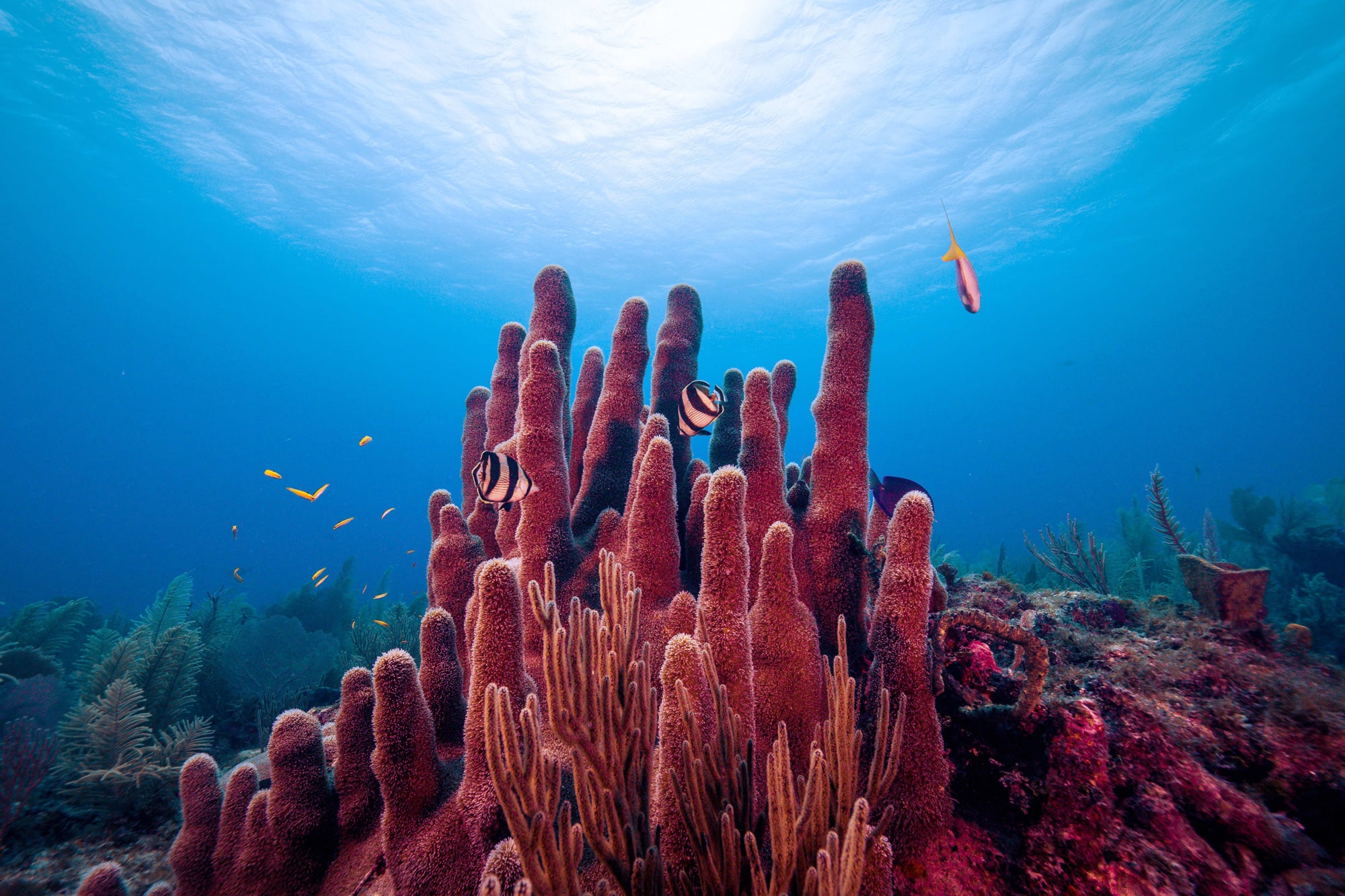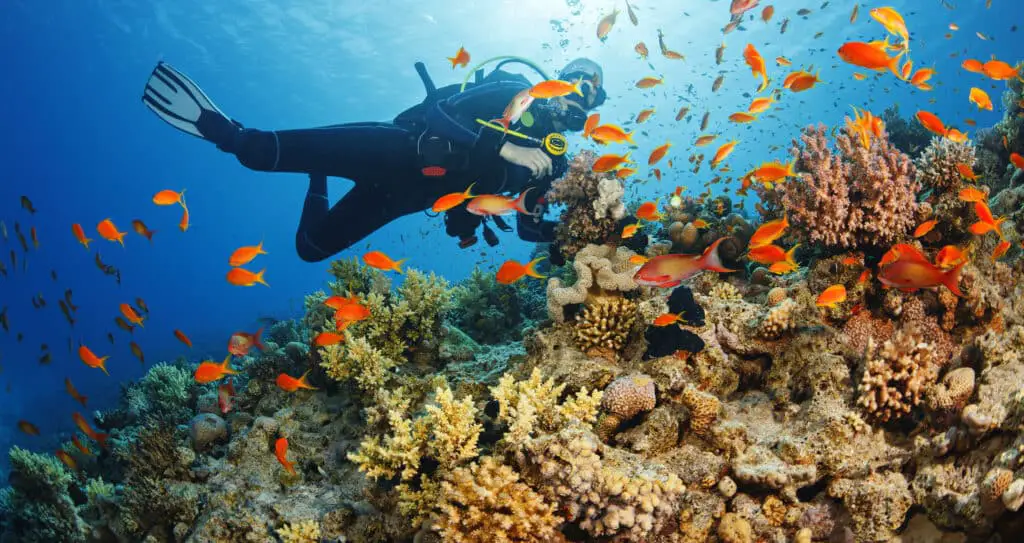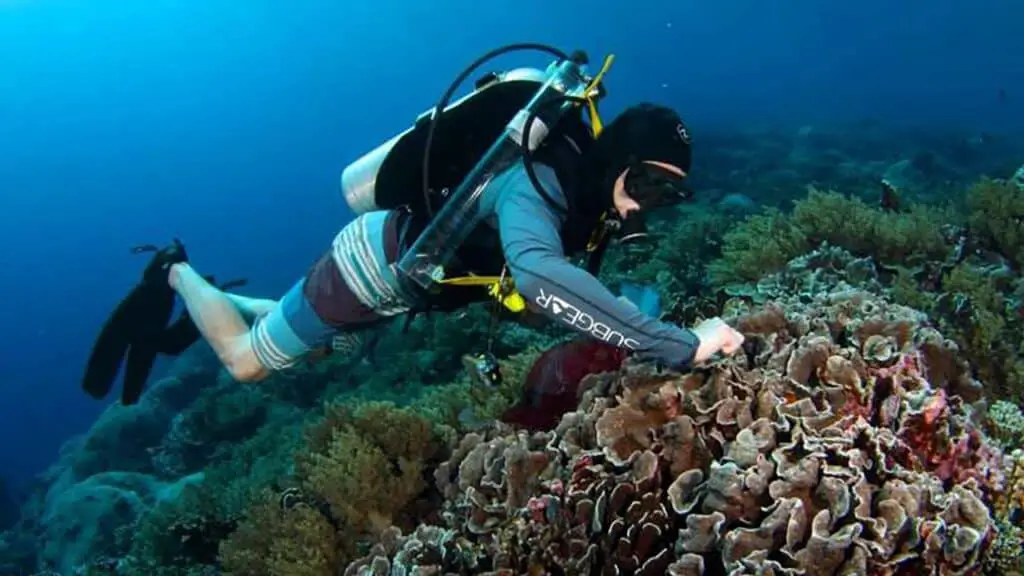How Do Coral Reefs Help Humans

Introduction
How Do Coral Reefs Help Humans: Coral reefs are among the most diverse and productive ecosystems on our planet, thriving in the warm, nutrient-rich waters of tropical oceans. While they are essential for marine biodiversity, these vibrant underwater communities also offer numerous direct benefits to humans. In this introduction, we will explore the multifaceted ways in which coral reefs help and support human societies.
First and foremost, coral reefs act as natural barriers, protecting coastlines from erosion and buffering the impacts of storm surges. Their intricate structures dissipate wave energy, safeguarding coastal communities from the devastating effects of hurricanes and tsunamis. Moreover, the economic significance of coral reefs cannot be overstated. They serve as vital breeding and nursery grounds for numerous fish species, supporting commercial and artisanal fisheries that provide food and livelihoods for millions of people around the world.
Coral reefs also contribute significantly to the global tourism industry. Tourists are drawn to their breathtaking beauty, making reef-based ecotourism a major source of income for many coastal regions. Furthermore, these ecosystems hold untapped potential for scientific and medical advancements. The unique chemical compounds produced by coral organisms are being explored for their pharmaceutical and biotechnological applications, offering hope for new drugs and treatments.
Coral reefs are not only spectacular natural wonders but also crucial lifelines for human well-being. Their preservation is essential, not just for the sake of our planet’s biodiversity but for the countless ways they enrich our lives and support our communities.

What are 3 important things about coral reefs?
Seven Surprising Facts about Coral
1: Corals Are Animals.
2: Corals Can Be Fluorescent.
3: Corals Eat Plankton/Small Fish.
4: There Are Hundreds of Coral Species of All Colors, Shapes and Sizes.
5: Corals Can Move.
6: Corals Support 25 Percent of Ocean Life.
7: Climate Change Is the Biggest Threat to Corals.
Coral reefs, often referred to as the “rainforests of the sea,” are immensely important and complex ecosystems that provide a multitude of benefits to our planet. Here are three crucial aspects of coral reefs:
Biodiversity Hotspots: Coral reefs are among the most biodiverse ecosystems on Earth. Despite covering less than 1% of the ocean floor, they host about 25% of all marine species. These vibrant ecosystems support a rich variety of life, including fish, corals, mollusks, sponges, and countless other organisms.
Coastal Protection: Coral reefs act as natural barriers, reducing the energy of waves and protecting coastlines from erosion and the devastating impacts of storms, including hurricanes and tsunamis. Coastal communities rely on healthy coral reefs as a form of natural infrastructure, safeguarding lives and property. The loss of these protective functions can lead to increased vulnerability to coastal hazards and the associated economic costs.
Economic and Cultural Value: Coral reefs contribute significantly to local economies through tourism, fisheries, and recreational activities. Tourism, in particular, draws millions of visitors to reef-rich destinations annually, generating revenue and employment opportunities for coastal communities.
How do coral reefs provide?
Providing food and shelter for sea creatures
Coral reefs are described as the tropical forests of the ocean, or as ocean oases. Providing shelter and spawning grounds to a wide range of ocean life, coral reefs serve an important role in the marine ecosystem.
Coral reefs are invaluable ecosystems that provide a multitude of essential services to both marine life and humans. Firstly, they support an extraordinary biodiversity of marine species, offering a safe haven for countless fish, invertebrates, and other organisms. This diversity is not only ecologically significant but also economically vital, as many fisheries depend on coral reefs for their productivity.
Secondly, coral reefs act as natural barriers, protecting coastal communities from the destructive forces of storms, tsunamis, and erosion. The intricate structure of coral formations dissipates wave energy, reducing the impact of these natural disasters on shorelines and coastal infrastructure.
Lastly, coral reefs also contribute significantly to tourism revenue in many regions, attracting divers and snorkelers from around the world. This tourism creates jobs and stimulates local economies, highlighting the economic value of these underwater wonders.
Coral reefs provide essential ecological, economic, and protective services, making their conservation a global priority. Efforts to protect and preserve these fragile ecosystems are crucial to ensure their continued benefits to both marine life and human society.
How do coral reefs affect human health?
Coral reefs and associated seagrasses beds even have been shown to directly keep humans out of harm’s way by reducing free-floating pathogens by up to 50%.
Coral reefs, often referred to as the “rainforests of the sea,” play a crucial role in maintaining human health in several ways. Firstly, they act as natural barriers, protecting coastal communities from the devastating impact of storm surges and tsunamis. By absorbing the energy of these natural disasters, coral reefs reduce the risk of property damage and save lives.
Moreover, coral reefs are biodiversity hotspots, hosting a wide variety of marine species that are vital sources of food and medicine for humans. Many coastal communities depend on reef fish as a primary source of protein, while coral-derived compounds are being studied for their potential in treating diseases like cancer, Alzheimer’s, and even HIV.
In addition to their role in providing sustenance and potential medical breakthroughs, coral reefs offer recreational and economic benefits through tourism and fisheries. Healthy reefs attract tourists, supporting local economies and employment opportunities.
Coral reefs are intricately linked to human health and well-being, serving as protectors, providers, and sources of economic prosperity. Their preservation is not only essential for the marine world but also for the health and livelihoods of coastal communities worldwide.
What are the uses and benefits of coral reefs?
Healthy coral reefs contribute to fishing and tourism, providing millions of jobs and contributing to economies all over the world. Scientists develop important drugs from coral reef organisms as treatments for cancer, arthritis, and viruses. But corals are threatened by pollution and climate change.
Coral reefs are invaluable ecosystems with a multitude of uses and benefits that extend beyond their role as vibrant underwater ecosystems. First and foremost, they serve as a critical habitat for a diverse array of marine species, making them vital for biodiversity conservation. This biodiversity, in turn, supports various industries and scientific research.
One of the most direct benefits of coral reefs is their significance to fisheries. They provide shelter and breeding grounds for numerous fish species, which are essential for global food security. Many coastal communities rely on reef fish as a primary source of protein, and the fishing industry generates significant economic income.
Coral reefs also contribute to tourism, attracting millions of visitors each year for activities like snorkeling, diving, and eco-tourism. This tourism generates substantial revenue for coastal economies, creating jobs and sustaining livelihoods.
Beyond these economic benefits, coral reefs offer coastal protection by acting as natural barriers against storm surges, erosion, and tsunamis. They absorb and dissipate wave energy, reducing the impact of such natural disasters on coastal communities.
Moreover, coral reefs are a source of scientific knowledge, offering insights into marine biology, climate change, and pharmaceutical research. Compounds derived from corals have shown potential in developing new medicines and treatments for various human diseases.
Coral reefs are essential for ecological balance, economic prosperity, coastal protection, and scientific advancement. Recognizing and preserving these invaluable ecosystems is crucial for both environmental conservation and human well-being.
What are 3 ways humans impact coral reefs?
Pollution, overfishing, destructive fishing practices using dynamite or cyanide, collecting live corals for the aquarium market, mining coral for building materials, and a warming climate are some of the many ways that people damage reefs all around the world every day.
Coral reefs, fragile and complex ecosystems, face significant threats from human activities. Three prominent ways in which humans impact coral reefs are:
- Climate Change: Perhaps the most pressing threat, climate change has far-reaching consequences for coral reefs. Rising sea temperatures, driven by greenhouse gas emissions, lead to coral bleaching, wherein corals expel their symbiotic algae and turn white. This weakens the corals and makes them more susceptible to disease. Additionally, ocean acidification, another consequence of increased carbon dioxide levels, hampers the ability of corals to build their calcium carbonate skeletons, essential for their survival.
- Overfishing and Destructive Fishing Practices: Overfishing, particularly in regions near coral reefs, disrupts the delicate balance of marine ecosystems. The removal of herbivorous fish, which control algae growth, can lead to algal overgrowth that smothers corals. Destructive fishing methods like blast fishing and cyanide fishing damage not only fish populations but also the corals themselves, causing physical harm and contributing to coral degradation.
- Pollution and Coastal Development: Runoff from agricultural and industrial activities introduces pollutants and sediment into coastal waters, which can smother and suffocate coral reefs. Coastal development often results in increased sedimentation, as well as the release of sewage and chemicals, further degrading water quality and the health of coral ecosystems.
Addressing these human impacts through sustainable practices, reducing carbon emissions, and implementing marine conservation efforts is crucial for the survival and well-being of coral reefs and the diverse marine life they support.
Are there any potential medical benefits from coral reefs?
Yes, coral reefs hold significant potential for medical benefits due to the myriad of unique organisms and compounds they harbor. Some of the potential medical benefits include:
- Pharmaceutical Research: Corals and the organisms associated with them produce a wide range of chemical compounds as a defense mechanism against predators and environmental stressors. Many of these compounds have shown promise in pharmaceutical research. For example, coral-derived compounds have been studied for their potential in developing new antibiotics, anti-inflammatory drugs, and treatments for diseases like cancer, Alzheimer’s, and HIV. Some compounds from coral reefs have already made their way into pharmaceutical products.
- Pain Relief and Neurological Research: Certain compounds from cone snails, which are often found in coral reef ecosystems, have been used to develop powerful pain relief medications. These compounds can block pain signals in a way that is different from traditional painkillers, making them valuable for managing chronic pain. Additionally, they offer insights into neurological research.
- Tissue Regeneration: Coral skeletons and their calcium carbonate structures have been explored for their potential in bone grafts and tissue engineering. They provide a natural framework for tissue regeneration, particularly in orthopedic and dental applications.
Overall, the biodiversity and unique chemical properties of coral reefs offer a treasure trove of potential medical benefits. However, it’s crucial to balance these opportunities with the need for reef conservation and sustainable practices to ensure the long-term health of these ecosystems.
Why is coral reef conservation important for humans?
Coral reef conservation is of paramount importance for humans due to the myriad of benefits these ecosystems provide to our planet and society. Firstly, coral reefs support fisheries that are vital for food security and livelihoods. Millions of people depend on reef fish as a primary source of protein, and the fishing industry generates income for countless coastal communities.
Secondly, coral reefs act as natural barriers, protecting coastlines from the devastating impact of storms and rising sea levels. They reduce wave energy, preventing erosion and safeguarding infrastructure. In this era of climate change, their role in mitigating the effects of extreme weather events is more crucial than ever.
Coral reefs also hold enormous potential for medical discoveries. They are a source of unique compounds with pharmaceutical applications, offering hope for the development of new drugs to combat diseases such as cancer and bacterial infections.
Moreover, coral reefs are a significant driver of tourism, attracting visitors from around the world. This tourism generates income, creates jobs, and stimulates local economies, particularly in developing countries.
Coral reef conservation isn’t just about protecting marine biodiversity; it’s about safeguarding food security, coastal resilience, potential medical breakthroughs, and economic prosperity. Preserving these delicate ecosystems is not only an environmental imperative but also a matter of human well-being and sustainable development.
What can individuals do to help protect coral reefs?
Individuals can play a vital role in protecting coral reefs by taking various actions to reduce their impact on these fragile ecosystems. Here are some ways individuals can contribute to coral reef conservation:
- Responsible Reef Tourism: When snorkeling or diving around coral reefs, follow responsible guidelines such as not touching or standing on the corals. Choose eco-friendly operators who prioritize reef protection and sustainability.
- Reduce Pollution: Minimize the use of single-use plastics, especially when near coastal areas. Dispose of trash properly, and participate in beach clean-up activities to prevent plastic and other pollutants from entering the ocean.
- Conserve Water: Use water-saving appliances and practices at home to reduce runoff of pollutants into the ocean. Less polluted runoff means healthier coral reefs.
- Support Sustainable Seafood: Choose sustainably sourced seafood to reduce overfishing and bycatch that can harm coral reef ecosystems.
- Coral-Friendly Sunscreen: Use coral-safe sunscreen products that do not contain harmful chemicals like oxybenzone and octinoxate, which can damage coral reefs.
- Advocate for Marine Protection: Support organizations and policies that advocate for marine conservation and the establishment of marine protected areas.

Conclusion
Their diverse array of benefits, ranging from coastal protection and fisheries support to tourism and potential medical breakthroughs, underscore their immense importance. However, the alarming rate at which coral reefs are deteriorating due to climate change, pollution, overfishing, and habitat destruction demands our urgent attention.
Preserving these vibrant underwater ecosystems isn’t just an ecological imperative; it’s a matter of human survival and prosperity. Efforts to combat climate change, reduce pollution, implement sustainable fishing practices, and establish marine protected areas are essential steps in safeguarding coral reefs and the countless advantages they provide.
Moreover, fostering awareness and encouraging responsible tourism and consumption can go a long way in ensuring the long-term viability of these ecosystems. Engaging local communities in reef conservation efforts, and empowering them with the knowledge and tools to protect their invaluable resources, is equally crucial.
Recognizing and valuing the myriad ways in which they enhance our lives can serve as a powerful motivator for collective action. As stewards of this planet, it is our responsibility to protect and preserve coral reefs for the benefit of current and future generations, as these vibrant underwater realms are not only vital to marine life but also to the very essence of our interconnected human existence.



